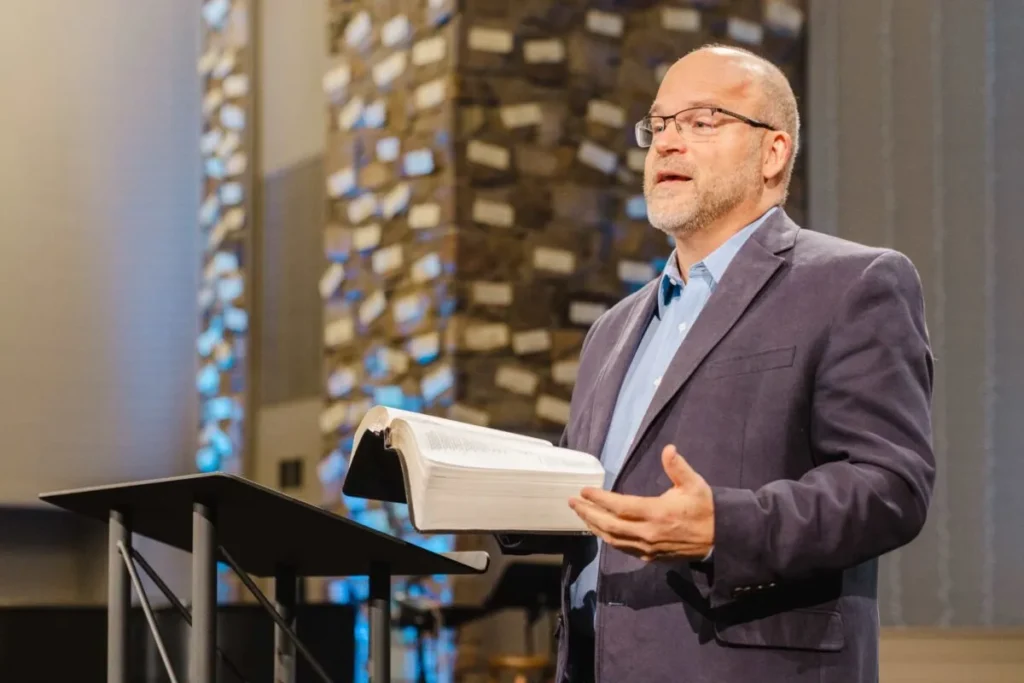Are you interested in knowing the potential signs your pastor doesn’t like you? Keep reading to know the various signs that indicate your pastor doesn’t like you.

Pastors are meant to love unconditionally no matter who the person is. When a pastor likes his congregation, it creates a connection built on faith, trust, and mutual respect.
However, there are some cases where a pastor might not like you due to some reasons.
If you feel your pastor doesn’t like you then keep reading to know the signs that suggest your pastor doesn’t like you.
Signs Your Pastor Doesn’t Like You

Here are potential signs that indicate your pastor doesn’t like you:
1. They Will Intentionally Ignore You
When your pastor intentionally ignores you in church and outside the church, it’s a sign that they don’t like you.
Another way to know if your pastor doesn’t like you is when your greetings go unnoticed.
Sometimes, they may choose to ignore your concerns and restrict your connection with the church community.
When you notice this when your pastor, it is important you confront him and address it with understanding.
2. No Encouragement and Support From Them
A pastor should always offer support and encouragement to motivate his members. If you feel like your pastor doesn’t encourage or support you in any way, it means your pastor doesn’t like you.
In addition, pastoral guidance plays a vital role in the spiritual growth of church members, and a lack of it can be disheartening.
3. You Get Excluded from Church Activities
When you are constantly being excluded from church activities and gatherings, it can be a sign your pastor doesn’t like you.
One of the duties of a pastor is to carry everybody along in the activities of the church.
Excluding a member from taking part in any church activities is not right and should be addressed properly.
When you notice that you are constantly being left out in every church activity, it is advisable you contact your pastor for valid reasons.
4. You Will Notice Unwelcoming Body Language From Them
Non-verbal cues, like body language, can say a lot about how your pastor feels about you.
If you notice your pastor constantly giving you unwelcoming body language, it’s a sign that your pastor doesn’t like you.
To notice this, pay attention to your pastor’s eye contact, handshake, and smile. When you notice his body language is not genuine, it means your pastor doesn’t like you.
Try addressing this issue when you notice he avoids eye contact with you or isn’t intentional with his greetings.
5. Experiencing Limited Pastoral Guidance
One of the signs that suggest your pastor doesn’t like you, is when he doesn’t provide guidance and support to you during hard times. Also, you know your pastor doesn’t like you when he neglects your spiritual growth.
A caring pastor should be always available to offer spiritual and emotional support and advice to their congregation.
When you don’t get this pastoral support, it can be a sign they don’t Like You.
6. You Experience Shortened Conversations With Them
When you experience shortened conversations with your pastor it’s a sign that your pastor doesn’t like you.
These shortened conversations can come in the form of quick responses or little interest in the conversation.
As a pastor, it is advisable to invest time in getting to know your congregation members. This can build meaningful connections and strengthen the relationship between a pastor and his members.
7. You Receive Unwarranted Criticism Them
In a Christian community, constructive criticism is valuable for personal and spiritual growth. If you receive unwarranted and constant criticism from your pastor, it may sign that your pastor does like you.
Furthermore, it’s essential to differentiate between constructive feedback and unjustified criticism to address this issue.
8. They Exhibit Excessive Favoritism
Pastors who exhibit excessive favoritism to some members of the church can destroy a church. If you notice that your pastor neglects you to favor other members, it’s a sign that your pastor doesn’t like you.
When you notice church favoritism from your pastor, it is advisable to ask for reasons behind this bias. When you address this, it can help in fostering a more inclusive and harmonious church community.
In conclusion, when you notice your pastor doesn’t like you, it is advisable to approach them concerning this.
Note that after you approach them and you observe no changes, you should go to another church where you can be loved.
Signs Your Church Doesn’t Want You

Here are potential signs your church doesn’t want you:
1. They Frequently Exclude You from Activities
Being excluded from church activities is a significant indicator that your church might not want you. This exclusion manifests when you are consistently left out of invitations to participate in church functions, volunteer opportunities, or social gatherings.
If you notice that other members are regularly informed about events and asked to contribute while you are overlooked, it might be intentional. This deliberate exclusion can make you feel unwelcome and undervalued, creating a sense of isolation within the community.
It sends a clear message that your presence and contributions are not desired, and it can significantly impact your sense of belonging and spiritual well-being. A church that values its members will ensure inclusivity and actively seek to involve everyone in its activities.
2. They Give You Minimal or No Support During Times of Personal Struggle
A fundamental aspect of any church community is providing support to its members, especially during times of personal struggle. If your church fails to offer spiritual and emotional support when you need it, it might be a sign that they do not care about your well-being or involvement.
This lack of support can manifest in various ways, such as not offering prayers, counseling, or assistance when you are facing difficulties. A supportive church community should rally around its members, providing comfort and help during tough times.
When this support is absent, it indicates a lack of concern for your needs and suggests that the church does not see you as an important part of the community.
3. You Experience Constant Judgment or Criticism From Church Members
A church should be a place of acceptance, love, and understanding. If you experience constant judgment or criticism from church members, it could indicate they do not want you there. This judgmental attitude can create an unwelcoming atmosphere that pushes people away.
For example, if you are frequently criticized for your lifestyle choices, appearance, or personal beliefs, it can make you feel ostracized and unwelcome.
Such negativity undermines the church’s role as a sanctuary for spiritual growth and community support. A church that values its members will practice compassion and acceptance, fostering a positive and inclusive environment.
4. Your Contributions and Presence Are Not Acknowledge
Feeling invisible in your church is another red flag. If your contributions and presence are not acknowledged, it can be disheartening. When you consistently feel ignored or unrecognized, it suggests that the church does not value your involvement.
This lack of acknowledgment can lead to feelings of alienation and decreased motivation to participate. A church that values its members will make an effort to recognize and appreciate their contributions, ensuring that everyone feels seen and valued.
5. You Keep Receiving Negative Feedback From Church Members
Receiving predominantly negative feedback can be discouraging and suggest that your presence is not valued. If your ideas or participation are met with criticism more often than encouragement, it might indicate that the church does not appreciate your contributions.
While constructive feedback is essential for growth, it should be balanced with positive reinforcement. Constant negativity can erode your confidence and make you feel unwelcome.
A church that values its members will provide a supportive environment where feedback is given with kindness and encouragement, fostering a sense of belonging and appreciation.
6. You Notice the Presence of Cliques and Favoritism Within the Church
The presence of cliques and favoritism within a church can make the environment feel exclusive and unwelcoming. If you observe that certain groups or individuals receive preferential treatment while others are marginalized, it can create a sense of division and exclusion.
Favoritism might manifest in various ways, such as certain members being given more responsibilities, recognition, or opportunities than others.
This behavior undermines the church’s role as an inclusive community and can make those who are excluded feel unwelcome. A church that values all its members will strive to eliminate cliques and ensure that everyone is treated with equal respect and consideration.
7. You Notice the Church Leaders Avoid Interacting With You
When church leaders avoid interacting with you, it can be a clear sign of disinterest. Effective leadership involves engaging with all members of the congregation, offering guidance, support, and inclusion. If the leadership consistently avoids you, it might indicate that they do not see you as a valued part of the community.
This avoidance can manifest in various ways, such as leaders not greeting you, ignoring your concerns, or failing to involve you in church activities. A church that values its members will have leaders who are approachable, inclusive, and actively engaged with the entire congregation.
8. They Don’t Give You Any Opportunities for Growth in the Church
A healthy church provides opportunities for personal and spiritual growth, such as Bible studies, mentorship programs, and leadership roles. If your church does not offer such opportunities or actively hinders your growth, it might be a sign that they do not want you to thrive within the community.
This lack of growth opportunities can make you feel stagnant and unappreciated. A church that values its members will invest in their development, offering various programs and activities that encourage spiritual and personal growth.
By fostering an environment where everyone can learn and grow, the church demonstrates its commitment to the well-being and advancement of its members.
5 Signs of a Dangerous Pastor

Here are potential signs of a dangerous pastor:
1. They Practice an Authoritarian Leadership Style
A dangerous pastor often exhibits an authoritarian leadership style. They demand unquestioning obedience and discourage any form of dissent. This type of leadership suppresses individuality and creates a toxic environment where members fear speaking up or expressing concerns.
2. They are not always Accountable to Their Members
Another red flag is a lack of accountability. A dangerous pastor avoids oversight and does not welcome feedback or criticism. They may operate without transparency, making decisions unilaterally. This behavior can lead to abuse of power and exploitation of the congregation.
3. They are always Manipulative
Manipulative behavior is a clear sign of a dangerous pastor. They may use guilt, fear, or emotional blackmail to control the congregation. This manipulation can make members feel dependent and powerless, undermining their autonomy and well-being.
4. They Financially Exploit Their Members
Financial exploitation is a serious concern. A dangerous pastor may pressure members to give excessive donations or mismanage church funds for personal gain. Transparency in financial matters is crucial, and any deviation from this can indicate underlying issues.
5. They Don’t Live By What They Preach
Moral hypocrisy is another indicator of a dangerous pastor. If a pastor preaches one set of values but lives by another, it undermines their credibility and trustworthiness. This hypocrisy can erode the moral foundation of the church and lead to disillusionment among members.
Knowing these signs can help you assess the health of your church leadership and take necessary actions to protect yourself and your community.
Signs of a Jealous Pastor

Here are potential signs of a jealous Pastor:
1. They Undermine Others’ Achievements
One sign of a jealous pastor is their tendency to undermine others’ achievements. When a pastor belittles or dismisses the accomplishments of church members or fellow leaders, it often indicates underlying jealousy. This behavior can manifest through subtle comments that downplay the significance of someone’s contributions.
For example, if a member successfully organizes a community event, a jealous pastor might dismiss the effort by attributing its success to external factors rather than the member’s hard work. This behavior can stifle growth and discourage participation within the congregation, as members may feel that their efforts are not valued or appreciated.
Over time, this can lead to a lack of motivation among church members to take the initiative or engage actively in church activities, ultimately harming the overall health and vibrancy of the church community.
2. They Constantly Withhold Opportunities From Members
A jealous pastor may withhold opportunities for others to shine, fearing that their own status or influence could be overshadowed. This behavior can manifest in various ways, such as restricting members from taking on leadership roles, speaking at events, or leading initiatives.
For instance, a pastor might prevent capable individuals from leading Bible study groups or organizing church events, even when they are clearly qualified and willing to do so.
This control over opportunities stems from the pastor’s insecurity and desire to remain the primary figure of authority and influence within the church. By limiting others’ chances to contribute and grow, the pastor ensures that no one else can emerge as a potential rival.
3. They Criticise Both Their Members or People Publicly
Public criticism is another red flag indicating a jealous pastor. If a pastor frequently criticizes individuals publicly, it often serves as a tactic to undermine those individuals while elevating the pastor’s own status by comparison.
This behavior can be seen in sermons, meetings, or casual conversations where the pastor calls out members’ mistakes or shortcomings in front of others.
For example, a pastor might publicly criticize a member’s interpretation of a Bible passage during a study group, or belittle someone’s efforts in organizing an event. This not only humiliates the individuals being criticized but also creates a culture of fear and distrust within the congregation.
4. They Keep Taking Credit for Others’ Work
Jealous pastors often take credit for others’ work, presenting ideas, projects, or successes initiated by others as their own. This behavior is driven by a desire to appear competent and influential while downplaying the contributions of others.
For instance, a pastor might present a successful outreach program or community event as their brainchild, even though it was developed and executed by church members.
This diminishes the efforts of those who actually did the work and can be deeply discouraging for individuals who contributed their time and energy. By taking credit for others’ achievements, the pastor aims to bolster their own reputation and authority.
However, this behavior can lead to resentment and disillusionment among church members, who may feel that their contributions are not recognized or valued. It also undermines trust and collaboration within the church community, as members may become wary of sharing ideas or taking initiative.
5. They Isolate or Hide Member’s Talents
Isolation of talented individuals is a common strategy of a jealous pastor. When a pastor perceives certain members as threats due to their talents or influence, they may attempt to isolate or alienate these individuals.
This can be done by excluding them from important meetings, not involving them in key decisions, or spreading negative rumors to damage their reputation.
By isolating these individuals, the pastor prevents them from gaining influence or recognition within the church. This behavior is driven by fear of competition and the desire to maintain control.
However, it can have detrimental effects on the church community, as it stifles the potential contributions of talented individuals and creates a toxic environment of division and mistrust.
A healthy church community should foster collaboration and support the growth of all its members, not just those who do not pose a threat to the leadership.
Signs of an Arrogant Pastor

Here are potential signs of an arrogant pastor:
1. They Often Show Little Interest in Feedback or Suggestions From the Congregation
An arrogant pastor often dismisses others’ opinions, showing little interest in feedback or suggestions from congregation members. They may interrupt, talk over, or outright ignore contributions from others during meetings or discussions.
This behavior stems from a belief that their views are inherently superior and that they have nothing to learn from others. If a church member suggests a new community outreach initiative, an arrogant pastor might immediately dismiss it without considering its potential benefits.
This dismissive attitude creates a disconnect between the pastor and the church community, as members feel their voices are not valued or heard. Over time, this can lead to decreased engagement and participation, as congregants may become disheartened by the lack of respect for their input.
2. They Often Lack Humility
A key sign of arrogance in a pastor is a lack of humility. An arrogant pastor frequently highlights their own achievements, often in an exaggerated manner, and downplays the contributions of others.
They may take credit for the success of church events, projects, or programs without acknowledging the efforts of the team involved. For example, they might give a sermon recounting their personal successes or emphasizing their role in the church’s growth, seeking praise and recognition from the congregation.
This constant self-promotion and quest for validation reflect a belief that they are indispensable to the church’s success. This lack of humility can alienate church members, as it undermines the collaborative spirit that is essential for a thriving church community.
3. They Don’t Tolerate Criticism From Others
Intolerance of criticism is another red flag indicating an arrogant pastor. When faced with critique, an arrogant pastor may react defensively or aggressively, perceiving any form of feedback as a personal attack.
They might retaliate against those who voice concerns, creating a climate of fear and silence within the congregation.
For instance, if a member questions a decision or suggests an alternative approach, the pastor might respond with hostility or publicly rebuke them. This intolerance not only stifles open dialogue but also discourages members from expressing their opinions or raising valid concerns.
4. They Practice Self-Centered Leadership
Self-centered leadership is a hallmark of an arrogant pastor. They prioritize their own needs and desires over those of the congregation, often making decisions based on personal gain rather than the collective good.
This might manifest in various ways, such as allocating church resources to projects that enhance their own status or comfort, rather than addressing the community’s needs.
An arrogant pastor might insist on renovating their office with the latest amenities while neglecting the maintenance of communal spaces used by the congregation.
This self-centered approach can lead to resentment and disillusionment among church members, who may feel that their welfare is secondary to the pastor’s personal interests. Effective pastoral leadership should be characterized by selflessness and a commitment to serving the entire community.
5. They Only Focus on Their Personal Vision
An arrogant pastor typically has an exclusive focus on their personal vision, often disregarding or devaluing the collective input of church members. They may push through their own agenda without considering the broader needs or goals of the congregation.
For example, they might implement a new church program or initiative without consulting the church board or seeking feedback from members. This narrow focus can result in unilateral decisions that do not reflect the diverse perspectives and needs of the church community.
Such an approach can stifle innovation and limit the church’s potential to grow and adapt. A pastor who values collaboration and inclusivity will actively seek and incorporate input from the congregation, ensuring that decisions are made in the best interest of the entire church.
Signs God Wants You to Leave Your Church

Here are potential signs God wants you to leave your church:
1. When You Feel That You Are Not Growing Spiritually
Spiritual stagnation is a significant sign that God may want you to leave your current church. If despite your best efforts, you feel that your spiritual growth has come to a standstill, it may be due to an environment that no longer nurtures your faith journey.
Spiritual growth is essential for deepening your relationship with God, and a lack of it can lead to feelings of emptiness or frustration. This stagnation might manifest as repetitive sermons that fail to challenge you, or a community that doesn’t encourage personal growth.
In such cases, seeking a new church that provides fresh insights, challenges your understanding, and supports your spiritual development might be necessary. God desires for you to continuously grow in faith, and a change in your church environment can reignite your spiritual journey.
2. When You Notice The Church’s Doctrine is Not Inline with God’s Word
Doctrinal conflicts are another clear indicator that it might be time to leave your church. If the teachings and beliefs promoted by your church significantly diverge from your understanding of the Bible, and these differences are causing confusion or distress, it’s a sign that you may need to find a church that aligns more closely with your beliefs.
Sound doctrine is crucial for a healthy spiritual life, as it shapes your understanding of God, guides your moral decisions, and influences your relationship with Him. Continuous exposure to conflicting teachings can lead to spiritual disorientation and weaken your faith.
3. When You Sense the Church is a Toxic Environment to Grow Spiritually
A toxic environment within your church is a serious concern and a clear sign that it is time to move from there.
If your church is characterized by gossip, power struggles, manipulation, or other unhealthy behaviors, it can be detrimental to your spiritual and emotional well-being. A church should be a sanctuary of support, encouragement, and love.
However, when negative behaviors dominate, they can create a hostile environment that stifles spiritual growth and fosters division. This toxicity can manifest in various ways, such as cliques that exclude others and leadership that abuses power.
4. When you Feel Isolated or Disconnected From Your Church Community
Feeling isolated or disconnected from your church community is another sign to leave. A healthy church fosters fellowship and support among its members, creating a sense of belonging and mutual encouragement.
If you find it difficult to build meaningful relationships, engage in activities, or feel a genuine sense of community, it might indicate that this church is not the right fit for you.
Loneliness and disconnection can hinder your spiritual growth and make you feel unsupported in your faith journey. Seeking a church where you can connect with others, share your experiences, and grow together in faith is important for your overall spiritual health.
5. When Keep Having Unresolved Issues With Church Leadership
Unresolved issues with church leadership or members can also be a sign that it’s time to leave your church. When attempts to address concerns or conflicts are consistently ignored or mishandled, it may indicate a deeper issue within the church’s structure or leadership.
Persistent unresolved issues can create a hostile environment and hinder your ability to worship and serve effectively. These unresolved conflicts might involve ethical breaches, mismanagement, or a lack of transparency and accountability from the leadership.
When your concerns are not taken seriously, it can erode trust and create a barrier to your spiritual engagement. Finding a church where issues are addressed openly and respectfully can help you maintain a healthy and productive faith life.
6. When You Experience a Constant Sense of Unease About Attending the Church
A loss of peace can be a powerful indicator that God is guiding you to leave your current church. If you experience a constant sense of unease, anxiety, or discomfort about attending your church, it might be God’s way of telling you that it’s time to move on.
Peace is a vital aspect of your relationship with God, and its absence should not be ignored. This lack of peace might manifest as dread before services.
It can also be a sense of discomfort during worship, or a general sense of spiritual unrest. God often uses feelings of peace or its absence to guide our decisions. Seeking a new church where you feel peaceful and spiritually fulfilled can be crucial for your spiritual and emotional well-being.
10 Things You Should Never Say to Your Pastor

1. You’re just a human, so why should I listen to you?
2. I don’t care what the bible says; I think you’re wrong.
3. Your sermons are boring and irrelevant.
4. I pay your salary, so you should do what I say.
5. You’re not a good enough leader for this church.
6. I’m not interested in what you have to say about my personal life.
7. You’re only here for the money and prestige.
8. I don’t like you, and I don’t care about your opinion.
9. You should just quit if you can’t handle criticism.
10. Why don’t you do more around here?
What to Do When Your Pastor Disrespects You

When your pastor disrespects you, it’s important to approach the situation with a calm and open heart. You can begin by reflecting on the incident to understand what specifically felt disrespectful and whether there might be any misunderstandings.
Consider scheduling a private meeting with your pastor to discuss your feelings and seek clarity. Approach the conversation with respect and a willingness to listen, expressing how the behavior affected you without being confrontational.
If the disrespect continues or if the conversation does not lead to a resolution, you may want to seek guidance from another trusted church leader or counselor. It’s essential to prioritize your emotional and spiritual well-being, and finding a respectful and supportive church environment is crucial.
When Your Pastor Hurts You
When your pastor hurts you, it can be a deeply emotional experience, especially when you place significant trust in them. First, acknowledge your feelings and give yourself time to process the hurt. Consider writing down your thoughts to organize your feelings.
It can be helpful to seek support from trusted friends, family, or a counselor. If you feel comfortable, approach your pastor to discuss the situation, explaining how their actions impacted you. Aim for a constructive conversation, focusing on resolution and understanding.
If addressing the issue directly with your pastor is not possible or does not bring closure, you might consider discussing the matter with other church leaders. You can find a community that better supports your spiritual and emotional needs.
How to Know if Your Pastor Likes You
To know if your pastor likes you, notice if they make an effort to engage with you, listen attentively to your concerns, and show genuine interest in your well-being. Positive signs might include consistent, respectful communication, and their willingness to offer guidance and support.
It’s important to remember that pastors often strive to treat all congregants with kindness and respect, as part of their role.
If you’re unsure about their feelings, ask for feedback or guidance directly. Clear, open communication can help you understand your relationship better and foster a positive connection.
When Your Pastor Ignores You
When your pastor ignores you, it can feel isolating and confusing. Start by considering possible reasons for their behavior. They might be dealing with personal issues, overwhelming responsibilities, or misunderstandings.
If their behavior persists, try reaching out to them directly, expressing your desire for communication and understanding. Approach the conversation with empathy, avoiding assumptions or accusations. If the situation does not improve, seek support from other church members or leaders to help mediate the issue.
It’s important to find a church community where you feel acknowledged and valued. If necessary, exploring other congregations might help you find a more supportive environment.
Related Searches:
